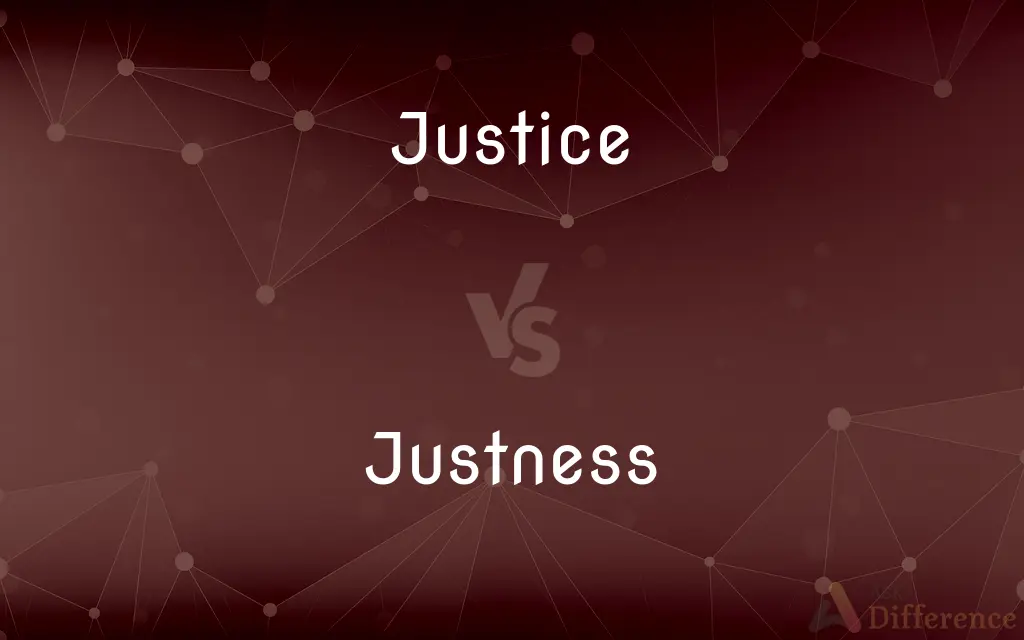Justice vs. Justness — What's the Difference?
By Tayyaba Rehman & Maham Liaqat — Updated on April 27, 2024
Justice refers to the fair administration of laws and moral principles in society, while justness focuses more specifically on the quality of being fair and righteous in individual actions or decisions.

Difference Between Justice and Justness
Table of Contents
ADVERTISEMENT
Key Differences
Justice is often considered in a broader societal context, dealing with legal systems and community ethics that uphold fairness, rights, and equality. On the other hand, justness is a more concentrated attribute, applicable to personal decisions or actions reflecting fairness and moral correctness.
In the realm of law, justice involves institutions like courts and police, ensuring that society operates under established legal frameworks fairly applied to all. Justness, however, pertains to the fairness inherent in individual judgments or behaviors within or outside legal contexts.
The pursuit of justice can involve complex processes, including legislation, enforcement, and judicial review, aiming for societal balance and protection of individual rights. Conversely, justness is more straightforward, often assessed in everyday actions and decisions that adhere to principles of equity and righteousness.
Justice is dynamic and can evolve with society, reflecting changes in collective moral and ethical standards. In contrast, justness is more static, representing a timeless principle of fairness that remains consistent regardless of societal shifts.
Activists and reformers often fight for justice by advocating changes in laws and policies to correct systemic inequities. Justness, meanwhile, is promoted through personal integrity and ethical conduct, influencing those around through example rather than systemic reform.
ADVERTISEMENT
Comparison Chart
Scope
Societal, involves systems and communities.
Individual, involves personal actions.
Focus
Legal rights, fairness, equality.
Moral correctness, fairness in conduct.
Implemented Through
Legal systems, courts, law enforcement.
Personal decisions, ethical behavior.
Changes Over Time
Evolves with societal norms and laws.
Generally constant, timeless ethical principle.
Key Advocates
Lawyers, judges, policy makers.
Ethical leaders, individuals with integrity.
Compare with Definitions
Justice
Community and societal balance.
The activist promoted justice through community engagement.
Justness
Ethical behavior in interactions.
Justness guided his actions during the negotiation.
Justice
Fair application of law.
The judge’s ruling reflected justice for the unfairly treated.
Justness
Integrity in judgments.
The leader's justness influenced his fair policies.
Justice
Moral fairness in society.
Justice was served when the new policy corrected old biases.
Justness
Adherence to moral correctness.
Her justness was apparent in all her business dealings.
Justice
Upholding rights and equality.
Social movements strive for justice across communities.
Justness
Fairness in personal conduct.
His justness in decision-making earned him great respect.
Justice
Systemic correction of wrongs.
The legal reforms brought justice to outdated practices.
Justness
Righteousness in daily life.
His justness in small matters reflected his overall character.
Justice
Justice, in its broadest sense, is the principle that people receive that which they deserve, with the interpretation of what then constitutes "deserving" being impacted upon by numerous fields, with many differing viewpoints and perspectives, including the concepts of moral correctness based on ethics, rationality, law, religion, equity and fairness. Consequently, the application of justice differs in every culture.
Justness
Honorable and fair in one's dealings and actions
A just ruler. ].
Justice
The quality of being just; fairness
In the interest of justice, we should treat everyone the same.
Justness
The state of being just; fairness
Justice
The principle of moral rightness; decency.
Justness
The quality of being just; conformity to truth, propriety, accuracy, exactness, and the like; justice; reasonableness; fairness; equity; as, justness of proportions; the justness of a description or representation; the justness of a cause.
In value the satisfaction I had in seeing it represented with all the justness and gracefulness of action.
Justice
Conformity to moral rightness in action or attitude; righteousness
Argued for the justice of his cause.
Justness
Conformity with some esthetic standard of correctness or propriety;
It was performed with justness and beauty
Justice
The attainment of what is just, especially that which is fair, moral, right, merited, or in accordance with law
My client has not received justice in this hearing.
Justness
The quality of being just or fair
Justice
(Law) The upholding of what is just, especially fair treatment and due reward in accordance with honor, standards, or law
We seek justice in this matter from the court.
Justice
The administration, system, methods, or procedures of law
A conspiracy to obstruct justice.
A miscarriage of justice.
Justice
Conformity to truth, fact, or sound reason
The overcharged customer was angry, and with justice.
Justice
Abbr. J.(Law) A judge on the highest court of a government, such as a judge on the US Supreme Court.
Justice
The state or characteristic of being just or fair.
The justice of a description
Justice
The ideal of fairness, impartiality, etc., especially with regard to the punishment of wrongdoing.
Justice was served.
Justice
Judgment and punishment of a party who has allegedly wronged another.
To demand justice
Justice
The civil power dealing with law.
Ministry of Justice
The justice system
Justice
A title given to judges of certain courts; capitalized when placed before a name.
Mr. Justice Krever presides over the appellate court
Justice
Correctness, conforming to reality or rules.
Justice
The quality of being just; conformity to the principles of righteousness and rectitude in all things; strict performance of moral obligations; practical conformity to human or divine law; integrity in the dealings of men with each other; rectitude; equity; uprightness.
Justice and judgment are the haditation of thy throne.
The king-becoming graces,As justice, verity, temperance, stableness, . . . I have no relish of them.
Justice
Conformity to truth and reality in expressing opinions and in conduct; fair representation of facts respecting merit or demerit; honesty; fidelity; impartiality; as, the justice of a description or of a judgment; historical justice.
Justice
The rendering to every one his due or right; just treatment; requital of desert; merited reward or punishment; that which is due to one's conduct or motives.
This even-handed justiceCommends the ingredients of our poisoned chaliceTo our own lips.
Justice
Agreeableness to right; equity; justness; as, the justice of a claim.
Justice
A person duly commissioned to hold courts, or to try and decide controversies and administer justice.
Justice
To administer justice to.
Justice
The quality of being just or fair
Justice
The administration of law; the act of determining rights and assigning rewards or punishments;
Justice deferred is justice denied
Justice
A public official authorized to decide questions bought before a court of justice
Justice
The United States federal department responsible for enforcing federal laws (including the enforcement of all civil rights legislation); created in 1870
Common Curiosities
How is justness typically assessed?
It is assessed through the fairness and morality of individual actions and decisions.
Why is justness important in leadership?
It ensures leaders make fair and morally sound decisions.
What is the main focus of justice?
It focuses on the fair application of laws and moral principles at a societal level.
Can justice exist without justness?
True justice ideally incorporates justness at both individual and systemic levels.
How do societal changes affect justice?
Justice evolves to reflect changing societal norms and values.
Can organizations have justness?
Yes, organizations can embody justness in their ethics and operations.
How does one demonstrate justness in everyday life?
Through consistently fair and ethical decisions in all interactions.
Does justness change with society?
Justness is a consistent ethical principle, less influenced by societal changes.
What role does justness play in personal relationships?
It fosters trust and respect through fair interactions.
How can individuals promote justice?
By advocating for fair policies and legal reforms.
What is an example of a justice system failure?
A failure occurs when the legal system does not fairly protect the rights of all citizens.
What is the relationship between justice and equality?
Justice seeks to ensure equality through the fair application of laws.
Share Your Discovery

Previous Comparison
Ardent vs. Fervent
Next Comparison
Show vs. ShowcaseAuthor Spotlight
Written by
Tayyaba RehmanTayyaba Rehman is a distinguished writer, currently serving as a primary contributor to askdifference.com. As a researcher in semantics and etymology, Tayyaba's passion for the complexity of languages and their distinctions has found a perfect home on the platform. Tayyaba delves into the intricacies of language, distinguishing between commonly confused words and phrases, thereby providing clarity for readers worldwide.
Co-written by
Maham Liaqat














































